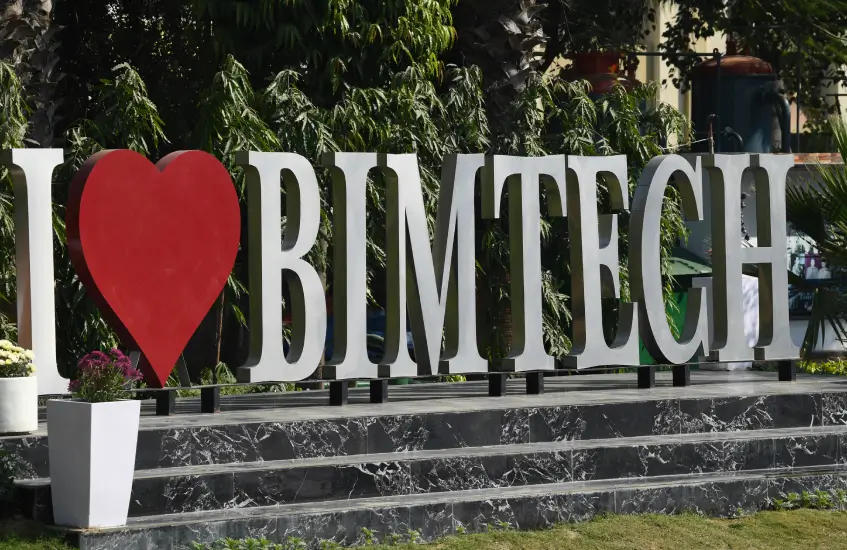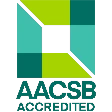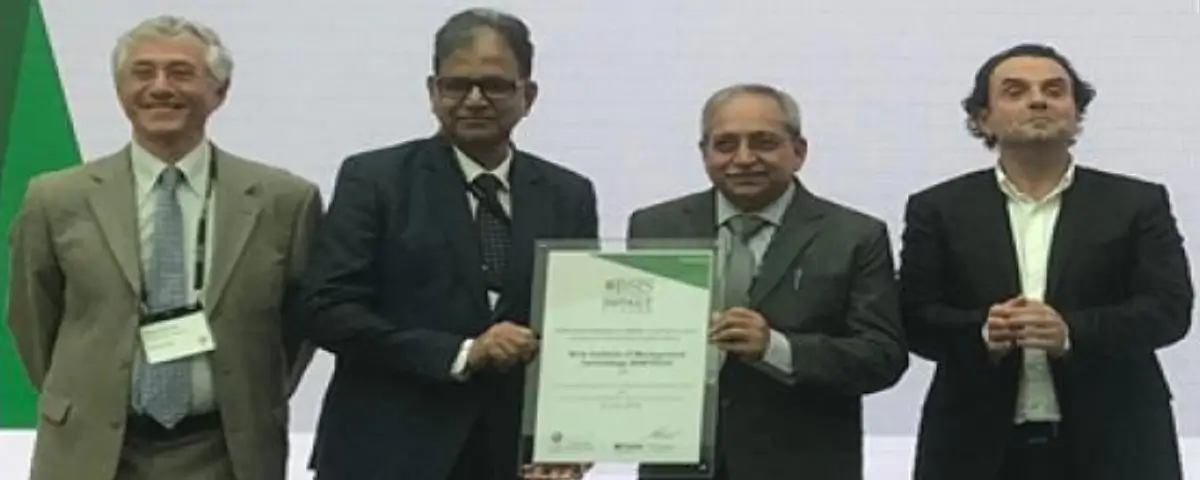Accreditations BIMTECH holds accreditations fromAACSB, NBA, and NAAC.

National Accreditation: The National Board of Accreditation (NBA) is one of the two major bodies responsible for the accreditation of higher education institutions in India, along with the National Assessment and Accreditation Council (NAAC).
BIMTECH has all four Postgraduate programmes, namely, PGDM, PGDM (IB), PGDM (RM), and PGDM (IBM) are accredited by the NBA, and renewal for NAAC is under process.




International Accreditation: BIMTECH has been awarded the coveted AACSB Accreditation, The Association to Advance Collegiate Schools of Business, a USA-based international accrediting agency) . Amongst 21 Indian B-Schools with Association to Advance Collegiate Schools of Business (AACSB) Accreditation
Rankings
Once again BIMTECH has maintained its position among the best Business Schools of India. According to the latest MBAUniverse.com B-school Rankings 2024, our institute has been ranked:
LIST OF TOP PRIVATE B-SCHOOLS
| Programme | B-school | Overall Rank |
|---|---|---|
| 1 | SP Jain Institute of Management and Research (SPJIMR) Mumbai | 5 |
| 2 | Narsee Monjee Institute of Management Studies (NMIMS) Mumbai | 12 |
| 3 | Institute of Management Technology (IMT) Ghaziabad | 14 |
| 4 | International Management Institute (IMI) New Delhi | 18 |
| 5 | T A Pai Management Institute (TAPMI) Manipal | 19 |
| 6 | XIM University (XIM) Bhubaneswar | 20 |
| 7 | Goa Institute of Management (GIM) Goa | 21 |
| 8 | K J Somaiya Institute of Management (K J SIMSR) Mumbai | 26 |
| 9 | Lal Bahadur Shastri Institute of Management (LBSIM) Delhi | 30 |
| 10 | Birla Institute of Management Technology (BIMTECH) Greater Noida | 32 |
| 11 | Jagdish Sheth School of Management (JAGSoM) | 33 |
| 12 | Prin. L.N. Welingkar Institute of Management (WELINGKAR) Mumbai | 34 |
| 13 | IFMR Graduate School of Business, Krea University | 35 |
| 14 | Symbiosis Institute of Business Management (SIBM) Bangalore | 38 |
| 15 | Institute of Management Technology (IMT) Hyderabad | 39 |
| 16 | Rajagiri Centre For Business Studies (RCBS) Kochi | 40 |
| 17 | Institute of Management Technology (IMT) Nagpur | 41 |
| 18 | Indus Business Academy (IBA) Bangalore | 42 |
| 19 | Jaipuria Institute of Management (JAIPURIA) Noida | 43 |
| 20 | Balaji Institute of International Business (BIIB) Pune | 44 |
| 21 | SDM Institute For Management Development (SDMIMD) Mysore | 45 |
| 22 | Jagan Institute of Management Studies (JIMS) Rohini | 46 |
| 23 | Jaipuria Institute of Management (JAIPURIA) Lucknow | 47 |
| 24 | International Management Institute (IMI) Bhubaneswar | 48 |
| 25 | Institute of Public Enterprise (IPE) Hyderabad | 49 |
| 26 | NTPC School of Business Noida | 50 |
Raising the Quality of Higher Education: The Defining Path
Dr H Chaturvedi, Director, BIMTECH, and also the Alternate President of Education Promotion Society for India (EPSI) with more than 42 years of experience in teaching, research and academic administration, firmly believes that for India to surge ahead in the globalized world, as a super power, trillion-dollar economy, there is a dire need to improve the quality standards in Higher Education.
His thoughts are now accessible through his book “Quality, Accreditation & Ranking: – A Silent Revolution in the Offing in Indian Higher Education”. It was released on February 14, 2019 by the Hon’ble Vice President of India, Shri M Venkaiah Naidu. The book has been edited by the Bloomsbury Publishing India Pvt Ltd, New Delhi.
It covers the entire philosophy and goal behind the accreditation process as seen in Indian Higher Education. In the recent past, due to the consistent steps taken by the Government, there is a slow realization by Universities and Institutes that accreditation score is very important while seeking a grant or starting a new programme.
Dr H Chaturvedi (Director, BIMTECH) in conversation with Dr Meena Bhatia, Associate Professor of Financial and Management Accounting
BIMTECH Awarded with the BSIS Label
BIMTECH is the 1st Indian B-school to be awarded with the EFMD Business School Impact System (BSIS) label; now joins global B-schools like CEIBS, HEC. This is the first time any Business School in India has completed this assessment. Dr Eric Cornuel, Director General & CEO and Dr Michel Kalika, Senior Advisor, EFMD presented BSIS award to Dr H Chaturvedi, Director, BIMTECH and Dr A K Dey of BIMTECH on June 6 2019, at a function in Lisbon.

The European Foundation for Management Development (EFMD) is one of the top international accreditation bodies. BSIS is the first comprehensive impact assessment tool for business schools that helps to demonstrate their impact upon its local environment – city or region.
EFMD Global Network and FNEGE are pleased to award the Business School Impact System Label to BIMTECH for its successful completion of the BSIS Impact enhancement process and for its on-going commitment to creating and increasing impact.
BIMTECH Granted Category 1 Graded Autonomy Status by AICTE
In its mandate to determine, promote and maintain the standards of Higher Education in India, the All India Council for Technical Education (AICTE) has decided to grant graded autonomy to better performing Standalone Institutions.
BIMTECH has been conferred with the prestigious Category 1 Graded Autonomy Status by the AICTE in February 2020. BIMTECH along with XLRI, Jamshedpur, are the only two institutions who have bagged this coveted recognition.
Dr Harivansh Chaturvedi, Director, BIMTECH speaks with Prof Archana Shrivastava, Area Head, Business Communication at BIMTECH tracing the vibrant journey of the 32-year-old institute from its old campus in Pushp Vihar, to being conferred the Category 1 Graded Autonomy status.
It is a well-established fact the world over that Autonomy and the institutional structures designed with this independence is truly pivotal in promoting and Institutionalising excellence in Higher Education. BIMTECH is now eligible for all the benefits stipulated under Clause 4 ( ‘Dimensions of Autonomy’) for Category-1 Standalone Institutions under the AICTE regulations.
BIMTECH with an energetic journey of around 32 years, coming on par with XLRI, which is over 70 years old, is proof of the speed and tenacity with which BIMTECH has built an Institute of Excellence, on par with global standards. These two institutions now belong to the higher echelons of management education in India.
This step by AICTE to grant graded autonomy to stand alone PGDM institutions is also part of the New Education Policy Draft that talks of autonomy being granted to all higher education institutions but it stresses that this should be based on the accreditation scores enjoyed by the institutions. Graded Autonomy is an integral part of the Dr Kasturi Rangan Committee on National Educational Policy (NEP) and AICTE has implemented it.
In the first instance, two institutions have been granted Level 1 and two other institutions have been granted Level 2 autonomy. This will create a huge demand for quality education and also motivate PGDM institutions to go for MBA Accreditation. AICTE requires that more than 75% programs should be accredited by the National Board of Accreditation (NBA) and the accreditation score should be more than 75%.
BIMTECH acquiring this stamp of recognition further reinforces its commitment to foster an intellectually vibrant environment whereby Standalone Institutions transform into Institutions of Global excellence.
| Sr. No | Regulatory Body | Courses Accredited / Approved | Document |
|---|---|---|---|
| 1 | Association to Advance Collegiate Schools of Business(AACSB) | Institute | View |
| 2 | All India Council for Technical Education (AICTE) | Institute / All courses | View |
| 3 | Category 1 Graded Autonomy Status by All India Council for Technical Education (AICTE) |
Institute | View |
| 4 | National Board of Accreditation (NBA) | PGDM and PGDM (IB), PGDM (RM), PGDM (IBM) | View |
| 5 | The National Assessment and Accreditation Council (NAAC) | Institute | View |
| 6 | Association of Indian Universities (AIU) | PGDM | View |
| 7 | Association of Indian Universities (AIU) | PGDM(IB) | View |
| 8 | Association of Indian Universities (AIU) | PGDM(RM) | View |
| 9 | Association of Indian Universities (AIU) | PPGDM (IBM) | View |
| 10 | Charted Insurance Institute (CII) –UK | PGDM (Insurance Business Management) | View |
| 11 | Insurance Institute of India – Mumbai | PGDM (Insurance Business Management) | View |